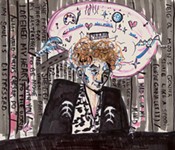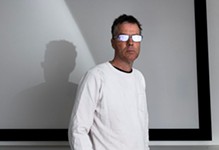DVD Watch: Potential-Gift Edition
By Shawn Badgley, Fri., Dec. 15, 2006
Symbiopsychotaxiplasm: Two Takes by William Greaves
Criterion, $39.95
Grey Gardens and the Beales of Grey Gardens
Criterion, $49.95

Actually, it's not necessarily that glaring a wrong. I'm still not convinced that 1976's Grey Gardens and Greaves' 1968 Symbiopsychotaxiplasm: Take One, itself rescued from oblivion in 1991 by a curator at the Brooklyn Museum and shepherded to avant-stardom by Steven Soderbergh and Steve Buscemi after the latter saw it at Sundance in 1992, are even documentaries. "That's what Symbio's all about," says Buscemi in a supplemental interview included with Symbiopsychotaxiplasm: Take 21Ú2, which he and Soderbergh helped produce in 2003. "Controlling the creation of reality."
Buscemi is a great actor, and both Symbios – like Al Maysles 30 years later with The Beales of Grey Gardens, Greaves got to go back and right wrongs, to extend stories, to add and adjust perspective with a companion piece that, as in the case of The Beales of Grey Gardens, Criterion has coupled with the original – are great actors' movies. Grey Gardens is an even better actors' movie. Doesn't this seem a little weird to you for documentaries?
Take One, inspired by Werner Heisenberg's Principle of Uncertainty as it relates to "social units of people" and "philosophy, mysticism, and the theatrical" (whatever that means), was an experiment in psychodramatic screen tests and making sure that the camera is going "where the energy goes," says Greaves in the accompanying video profile "Discovering William Greaves," which also highlights his other, somewhat more mainstream social efforts like Ali, the Fighter and From These Roots. "What would it look like if you took a group of very highly intelligent people and subjected them to this complete revolt against the traditions of Hollywood filmmaking?" In response, I would say that it looks like actors losing their minds, crew losing their patience, and a director losing control. According to his original "concept," included with Amy Taubin's excellent essay in the two-disc set's 36-page booklet, this is exactly what Greaves was looking for.
"Rumors of unrest and revolution in the crew should develop, should lead to encounters with the director. This film is rebellion!" he writes. "This film will tell itself. This film is about us, about the cast, crew, and onlookers, about us all as part of nature, and nature has its own story to tell." Or, as he informs a Central Park cop asking for his shooting permit – yeah, forgot to mention that all of this is being shot on three cameras during a few summer days in the middle of a big park – Take One is a "feature-length I don't know."
Whatever it is – postmodern fiction, distant DFH ancestor, protest story song – it was decades ahead of its time.
Decades later, then, 21Ú2 explodes off of the screen with symmetrical vengeance. It keeps a promise, fulfills a prophecy, proves Greaves right. Performances by Shannon Baker and Audrey Heningham in the middle-aged return of Take One's variously portrayed Freddie and Alice – the arguing suburban couple serving as sole characters in the director's "conventional theatrical short inside a major unconventional feature" – finally free the film, revealing its true identities.
Missing for us in Albert Maysles' return to Grey Gardens is any such closure with The Beales. In fact, there's no contemporary footage other than the director's bonus introduction, which serves mainly as rationale. A reference to footage shot in Florida, where star subject Little Edie Bouvier Beale relocated from the Hamptons in 1997 and lived until her death in 2002, is nowhere to be found. So unlike Criterion, which also leaves out Greaves' watershed short "Emergency Ward" in the Symbio set. But as The New Yorker's Hilton Als asserts in his essay for Grey Gardens, included here, "What draws the viewer in are the stories around what we cannot see." The same holds true for its sequel.
The story we cannot see is that both Big and Little Edie, those competing bursts of color once trapped in the drab of a society that had shunned them, would eventually lose each other. "We loved those two women very much," Albert says. The story we cannot see is that Albert has lost David, and this has become a personal project for him that will at the same time satisfy the film's hardcore cult. That it will "bring us all together." As he sorted through unused stuff – longer scenes and more sustained back-and-forth among the filmmakers and their subjects, not to mention a frigging house fire – he must have realized that less was never more for Little Edie; why should it be here? That's a challenging documentary to make or to watch. The one about how moments even caught on film can somehow escape you. No handbook can help you do it.








